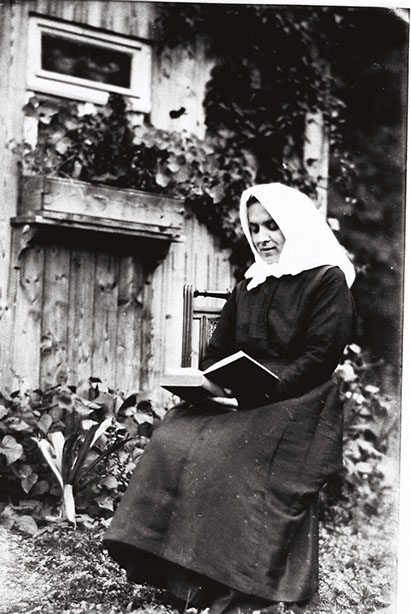Life without food
Life without taking food is a frequent, but not essential accompaniment of stigmatisation. It describes the fact, that a person does neither eat nor drink anything for years.
The phenomenon of living without food occurred to Therese in succession. Since Christmas 1922, she took only liquids, since the feast of Transfiguration of Christ on August 6, 1926, she drank only one spoon of water, 6-8 drops, to swallow the Host. Since September 1927, even this little spoon of water was not taken anymore (Teodorowicz, p.330). However, the daily Holy Communion was basic for her survival. If there was more than one day between the last and next Holy Communion, she fell into a faint-like weakness, and only receiving Holy Communion could take her out of this condition. The effect of the Holy Communion was described, among others, by the Curate Fahsel as follows: First a distinct physical invigoration is noticeable. Often, she had been in a pitiably condition ... Small and sunken in was her face. She had dark rings around her eyes. She was barely able to take a seat on the chair behind the altar. After receiving Holy Communion, everything was gone" (Fahsel, p.88).
To substitute natural food with spiritual nourishment accomplishes in a mysterious way the words of Christ: "It was not Moses who gave you bread from the heavens; it is my Father who gives you the real heavenly bread ... I myself am the living bread coming down from heaven ... the bread I will give is my flesh, for the life of the world ... For my flesh is real food ..." (John 6,32; 6,51; 6,55).
The public had doubts about Therese's life without food, so the Bishop of Regensburg, Antonius von Henle, asked for a medical certification of the phenomenon, in 1927. Therese and eventually also her father agreed to an examination, which took place from July 14 - 28, 1927. Therese was observed around the clock under medical instruction and supervision. The result of this examination was made public by Prof. Ewald and the Diocesan Authorities. They confirmed that Therese lives without taking any food (see chapter Biographie).
The discussion about Therese Neumann's life without taking any food flared up again during the time of National Socialism. Consequently in 1936, the Cathedral Chapter pressed for another, this time stationary examination of Therese Neumann's general state of health and her life without taking any food. Again, Therese agreed. Considering the often heard demand of the National Socialistic public, Therese should be brought into a Mental Institution, as well as the repeatedly heard remark ".. if we only have her in the clinic, we will take care of the fitting injections" (Steiner, Theres Neumann, p.60), father Neumann was afraid, this exmination would do great harm to his daughter. Among others, Prof. Lechner, Eichstätt, the Cardinals Konrad von Preysing, Berlin, and Michael Faulhaber, München, warned against the stay in a clinic, especially since it had become known, that several for the National Socialists 'disagreeable persons' had died in this clinics under mysterious circumstances, or had just disappeared. Thus, her father refused to give his consent.
Nevertheless, in 1940, there was an opportunity for a second observation and testification of her life without taking food: "between July 07 - 13, Therese had to stay in bed in the house of the Wutz family in Eichstaett [not in Konnersreuth, the author], after she had suffered a stroke (Apoplexia cerebri), whereupon one half side of her body was paralysed. She was completely dependent on others. On order of Bishop Michael Rackl, she was kept under strictest control during this time" (Steiner, Lebensbild Therese Neumann, p. 28).
Statements given under oath of all participants of this Observation Committee, participating Medical Doctors, University Professors as well as several contemporary witnesses, proved Therese's life without taking any food to be true.
On January 15, 1953, in Eichstaett, Therese gave the following statement under oath:
1. Not being able to give an exact date, eating less food was going on during the illness following the accident in 1918, therefore around 1918/1919.
2. From Christmas 1926, I have been living entirely without taking food, without any need for food and drink; during the time between Christmas 1926 and September 1927, I took a little spoon of water with the Holy Host of Communion. Since that time, this also has been omitted; already since August 6, 1926, I felt a real disgust at food and aversion to it.
3. For a certain length of time, I tried to take liquid food, yet I had to vomit (with some choking) all of it, so I stopped the attempt. Since that time, I feel much better, because the mentioned choking and connected heart-trouble have disappeared. Already since Christmas 1922 until this day, swallowing (the host of Holy Communion in [my] usual condition) causes greatest discomforts.
4. ....I am convinced of it and to my knowledge, I live by the Sacramental Saviour, He is within me...until shortly before the next receiving of Holy Communion. Once the substance of the Sacrament has dissolved, I feel weak and have a greater physical and spiritual longing for Holy Communion" (Steiner, Visionen vol.2, p.287).
